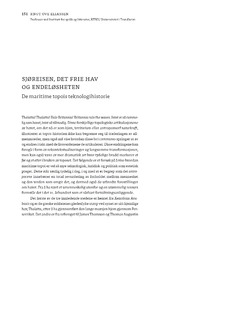Sjøreisen, det frie hav og endeløsheten. De maritime topois teknologihistorie
Journal article, Peer reviewed
Published version
Permanent lenke
http://hdl.handle.net/11250/2490303Utgivelsesdato
2017Metadata
Vis full innførselSamlinger
Originalversjon
K & K : kultur og klasse : kritik og kulturanalyse. 2017, 45 (123), 151-172.Sammendrag
Early Romanticism established and developed a series of poetical maritime common places intended to convey the pure forceful and inhuman being of Nature. “Storm at Sea”, “The Endless Ocean” and “The monstrous deep” are but three of many topological variation of “The Ocean”, gaining widespread popularity in the 19th and the 20th centuries and gradually turning into cultural clichés. This article argues that the long history of maritime narratives contains a much richer and indeed both critical and instructive legacy of topological figures than the semantically rather limited legacy of Romantic poetry. Analyzing a wide range of examples spanning from Homer to Joseph Conrad by way of François Rabelais and Daniel Defoe, this article suggests that the topologies of maritime narratives are exemplary cases of what Mikhail M. Bakhtin called chrono-topes, that is, epistemologically and politically charged configuration of literary time-spaces. The ocean-spaces of the early modern sea narratives are explicitly informed by the technological and political realities of their times, thus yielding a rich material that reflects how our ways of experiencing the oceans cannot be separated from the protocols, tools and crafts that determines our interfaces with the world.
